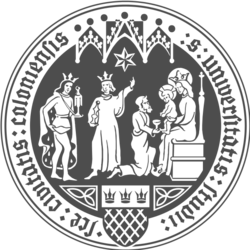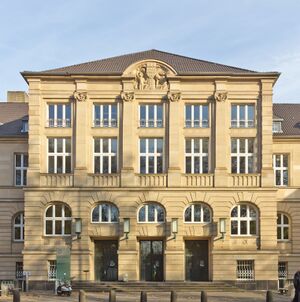University of Cologne
(University) | |
|---|---|
 | |
| Formation | 1388 |
| Headquarters | Cologne, Germany |
| A leader in the area of economics and is regularly placed in top positions for law and business | |
The University of Cologne (Universität zu Köln) is a university in Cologne, Germany. It was the sixth university to be established in Central Europe[1] and, although it closed in 1798 before being re-established in 1919, it is now one of the largest universities in Germany with more than 48,000 students. The University is a leader in the area of economics and its alumni regularly get to top positions, both in law and busines.
History
1388–1798
The University of Cologne was established in 1388 as the fourth university in the Holy Roman Empire, after the Charles University of Prague (1348), the University of Vienna (1365) and the Ruprecht Karl University of Heidelberg (1386). The charter was signed by Pope Urban VI. The university began teaching on 6 January 1389.
In 1798, the university was abolished by the French, who had invaded Cologne in 1794, because under the new French constitution, many universities were abolished all over France. The last rector Ferdinand Franz Wallraf was able to preserve the university's Great Seal, now once more in use.
1919–today
In 1919, the Prussian government endorsed a decision by the Cologne City Council to re-establish the university. This was considered to be a replacement for the loss of the University of Strasbourg on the west bank of the Rhine, which contemporaneously reverted to France with the rest of Alsace. On 29 May 1919, the Cologne Mayor Konrad Adenauer signed the charter of the modern university.
At that point, the new university was located in Neustadt-Süd, but relocated to its current campus in Lindenthal on 2 November 1934. The old premises are now being used for the Cologne University of Applied Sciences.
Initially, the university was composed of the Faculty of Business, Economics and Social Sciences (successor to the Institutes of Commerce and of Communal and Social Administration) and the Faculty of Medicine (successor to the Academy of Medicine). In 1920, the Faculty of Law and the Faculty of Arts were added, from which latter the School of Mathematics and Natural Sciences was split off in 1955 to form a separate Faculty. In 1980, the two Cologne departments of the Rhineland School of Education were attached to the university as the Faculties of Education and of Special Education. In 1988, the university became a founding member of the Community of European Management Schools and International Companies (CEMS), today's Global Alliance in Management Education.
Alumni on Wikispooks
| Person | Born | Died | Nationality | Summary | Description |
|---|---|---|---|---|---|
| Rainer Barzel | 20 June 1924 | 26 August 2006 | Germany | Politician | German politician who attended the 1965 Bilderberg |
| Werner Baumann | 3 October 1962 | Germany | Businessperson | Attended the 2017 Bilderberg as Bayer CEO | |
| Fritz Berg | 27 August 1901 | 3 February 1979 | Germany | Deep state actor Businessperson | President of the Federation of German Industries - "the real government of West Germany" - for over 20 years. 13 Bilderbergs. |
| Oliver Bäte | 1 March 1965 | Germany | Businessperson | German businessman with supranational deep state connections | |
| Franz Froschmaier | 29 July 1930 | 8 January 2013 | Germany | Politician Lawyer | German lawyer/politician |
| Hans Globke | 10 September 1898 | 13 February 1973 | Germany | Lawyer Deep state actor | High ranking jurist during the Nazi government; After the war one of the most powerful people in the German government. |
| Eric Gujer | 24 July 1962 | Switzerland | Spook Editor | Spooky Swiss editor-in-chief of the Neue Zürcher Zeitung | |
| Heribert Hellenbroich | 14 May 1937 | 10 July 2014 | Germany | Spook | Former Verfassungsschutz and BND chief. Had to retire after spy scandal. |
| Timotheus Höttges | 18 September 1962 | Germany | Businessperson | German telecom executive | |
| Paul Janssen | 12 September 1926 | 11 November 2003 | Belgium | Doctor Businessperson | Belgian businessman who founded Janssen Pharmaceutica, which became a subsidiary of Johnson & Johnson in 1961 |
| Peter Jungen | 21 August 1939 | Germany | Deep state operative Businessperson | At least 4 visits to Le Cercle... Personal assistant to Otto Wolff von Amerongen | |
| Klaus Kinkel | 17 December 1936 | 4 March 2019 | Germany | Spook Politician Lawyer | German politician, spook, diplomat, lawyer |
| Graf Otto Lambsdorff | 20 December 1926 | 5 December 2009 | Germany | Politician Deep state operative | Attended the 1980 and 1984 Bilderbergs as West Germany/Federal Minister of Economics. |
| Karl F. Lamers | 11 November 1935 | 27 August 2022 | Germany | Politician | |
| Arend Oetker | 30 March 1939 | Germany | Businessperson | German businessman, Chairman of Atlantik-Brücke for 5 years, named one of the: "50 most powerful people in the German economy" | |
| Robert du Plooy | 5 July 1921 | South Africa | Diplomat Deep state operative | South African deep state operative/diplomat who attended Le Cercle in South Africa in 1984. | |
| Gerhard Prinz | 5 April 1929 | 29 October 1983 | Germany | Businessperson | Attended the 1980 Bilderberg as Chairman of the Board of Management of Daimler-Benz AG |
| Franz Schoser | 27 July 1933 | Germany | Lobbyist | German business lobbyist who attended the 1979 and 1980 Bilderbergs | |
| Sławomir Sikora | 30 March 1962 | Poland | Academic Banker Economist | Polish Bilderberg banker, TLC | |
| Max Graf Thurn | 5 December 1910 | 29 June 1991 | Austria | Economist Civil servant | Austrian aristocrat and economist. In exile after the Anscluss. After WW2, returned to Austria as civil servant. Attended Bilderberg/1961. |
| Hans Tietmeyer | 18 August 1931 | 27 December 2016 | Germany | Economist Central banker | President of the German Bundesbank |
| Günther Verheugen | 28 April 1944 | Germany | Politician | German politician who attended the 1995 Bilderberg | |
| Bernhard Worms | 14 March 1930 | Germany | Politician | German politician who attended Le Cercle in Bonn in 1983. | |
| Uğur Şahin | 19 September 1965 | Germany | Doctor Scientist Businessperson | Turkish-German co-founder and CEO of BioNTech. |
References
- ↑ Prague (1348), Kraków (1364), Vienna (1365), Pécs (1367), Heidelberg (1386), Cologne (1388)
